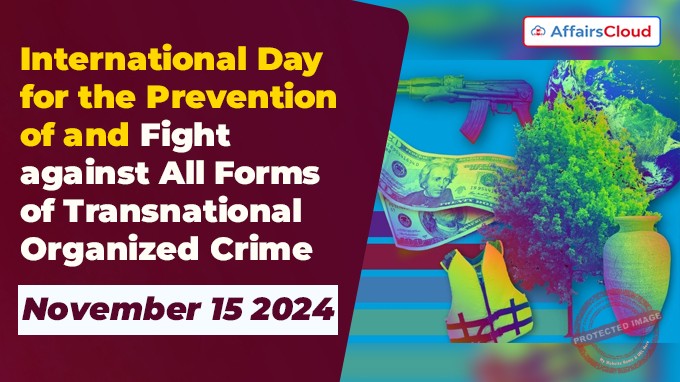 The first-ever United Nations (UN)’s International Day for the Prevention of and Fight against All Forms of Transnational Organized Crime (TOC) was observed across the globe on 15th November to raise awareness about the dangers of various types of transnational organized crime and to strengthen global collaboration to address them.
The first-ever United Nations (UN)’s International Day for the Prevention of and Fight against All Forms of Transnational Organized Crime (TOC) was observed across the globe on 15th November to raise awareness about the dangers of various types of transnational organized crime and to strengthen global collaboration to address them.
Theme:
The theme of International Day for the Prevention of and Fight against All Forms of TOC 2024 is “Organized crime steals, corrupts and kills. It’s time we pull together to push back”.
- The theme highlights how organized crime harms society by stealing resources, spreading corruption, and causing damage. It urges everyone to work together to fight back and stop it
Background:
i.In March 2024, United Nations General Assembly (UNGA) Resolution 78/267 designated 15th November on each year as the International Day for the Prevention of and Fight against All Forms of TOC.
ii.It recognized that preventing and combating transnational organized crime is essential for achieving the goals of the 2030 Agenda for Sustainable Development Goals (SDG).
What is Transnational Organized Crime(ToC)?
Slavery, Drugs, Weapons and Corruption are the hallmarks of transnational organized crime, a multi-billion-dollar industry that operates across borders, exploiting vulnerable people and undermining global security.
Types:
i.Drug Trafficking: Drug trafficking is the largest TOC sector globally, involving production, smuggling, and distribution.
- The latest World Drug Report estimates that almost 300 million people used drugs in 2021, including cocaine, methamphetamine and opium, an increase of more than 20 per cent over the previous decade.
- The number of people suffering from drug use disorders soared to nearly 40 million, a 45 per cent increase over ten years.
ii.Human trafficking : Human trafficking is a grave violation of human rights, a form of modern-day slavery.
- The latest Global Report on Trafficking in Persons shows that about 50,000 cases in over 140 countries were reported to UNODC in 2020.
- Around 60 per cent of all trafficking victims and over 90 per cent of those trafficked for sexual exploitation were women and girls.
iii.Smuggling of migrants: The migrant smuggling trade, driven by the movement of people across international borders for financial gain, is a lucrative criminal enterprise.
- In 2016, it was estimated that at least 2.5 million migrants were smuggled, generating profits of up to $5.7 billion for smugglers. A 2018 UNODC study identified 30 major smuggling routes worldwide, highlighting the vast scope of this illicit activity.
iv.Money laundering: Money laundering is the process of concealing the origins of illegally obtained money, turning “dirty money” into “clean money”.
- According to a UN report on Financial Integrity, around $1.6 trillion or 2.7 per cent of the global GDP are estimated to be laundered yearly, distorting economies, hindering development, and eroding trust in the financial system.
v.Illicit trading in firearms: The growing illicit trade in firearms is fueling conflicts and contributing to a dramatic increase in criminal activity in many parts of the world.
- In 2021 alone, 260,000 people were killed by small arms (firearms intended for individual use), amounting to 45% of all violent deaths that’s more than 700 people a day, or one person dying every two minutes.
vi.Cybercrime: Cybercrime encompasses a wide range of offences, from online fraud and data theft to the exploitation of children.
- In 2023 alone, ransomware payments reached an estimated US$1.1 billion. These attacks disrupt essential services like healthcare and banking, and erode public trust and safety.
vii.Crimes that affect the environment:The trafficking of wildlife and natural resources hampers conservation efforts, damages ecosystems, and undermines our planet’s capacity to mitigate climate change.
- According to the latest World Wildlife Crime Report, from 2015 to 2021, seizures documented the illegal trade of 13 million plants and animals in 162 countries and territories, affecting around 4,000 species. The majority of these species are listed in the Convention on International Trade in Endangered Species of Wild Fauna and Flora.
Palermo Convention :
i.Palermo Convention or the United Nations Convention against Transnational Organized Crime, adopted by UN General Assembly resolution 55/25 of 15 November 2000, is the main international instrument in the fight against transnational organized crime.
ii.It opened for signature by Member States at a High-level Political Conference convened for that purpose in Palermo, Italy, on 12-15 December 2000 and entered into force on 29 September 2003.
2024 Event:
The United Nations Office on Drugs and Crime (UNODC) led a campaign such as breaking up trafficking networks and encouraging sustainable alternatives to illegal activities.
- On 15th November 2024, UNODC hosted a High-Level Event to celebrate the 1st International Day for Preventing and Combating All Forms of Transnational Organized Crime.
About United Nations Office on Drugs and Crime (UNODC):
UNODC was established in 1997 as a result of merging of the United Nations Centre for International Crime Prevention and the United Nations International Drug Control Programme.
Executive Director(ED) – Ghada Waly
Headquarters – Vienna, Austria




